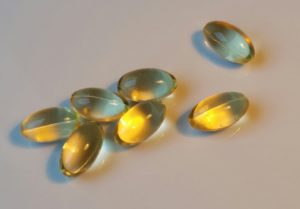 Two more studies found that higher levels of vitamin D in the blood are associated with better health outcomes - one study found a lower risk of breast cancer, especially among postmenopausal women, and in the other - better outcomes after a metastatic melanoma diagnosis.
Two more studies found that higher levels of vitamin D in the blood are associated with better health outcomes - one study found a lower risk of breast cancer, especially among postmenopausal women, and in the other - better outcomes after a metastatic melanoma diagnosis.
The breast cancer study suggested that a fairly high blood level of vitamin D (25(OH)D serum level>38.0 ng/mL) was associated with a lower risk of breast cancer. But overall they found that women supplementing with vitamin D (more than 4 times a week) at any dose had a lower risk of breast cancer over a 5 year period than those not supplementing with vitamin D. From Environmental Health Perspectives:
Serum Vitamin D and Risk of Breast Cancer within Five Years
Vitamin D is an environmental and dietary agent with known anticarcinogenic effects, but protection against breast cancer has not been established. We evaluated the association between baseline serum 25-hydroxyvitamin D [25(OH)D] levels, supplemental vitamin D use, and breast cancer incidence over the subsequent 5 y of follow-up. From 2003-2009, the Sister Study enrolled 50,884 U.S. women 35-74 y old who had a sister with breast cancer but had never had breast cancer themselves. Using liquid chromatography-mass spectrometry, we measured 25(OH)D in serum samples from 1,611 women who later developed breast cancer and from 1,843 randomly selected cohort participants.
We found that 25(OH)D levels were associated with a 21% lower breast cancer hazard (highest versus lowest quartile). Analysis of the first 5 y of follow-up for all 50,884 Sister Study participants showed that self-reported vitamin D supplementation was associated with an 11% lower hazard. These associations were particularly strong among postmenopausal women.
In this cohort of women with elevated risk, high serum 25(OH)D levels and regular vitamin D supplement use were associated with lower rates of incident, postmenopausal breast cancer over 5 y of follow-up. These results may help to establish clinical benchmarks for 25(OH)D levels; in addition, they support the hypothesis that vitamin D supplementation is useful in breast cancer prevention.
The first sentence in the melanoma study lays out what is widely known: "Vitamin D deficiency (≤20 ng/mL) is associated with an increased incidence and worse prognosis of various types of cancer including melanoma." Studies show that the relationship between vitamin D, sunlight exposure, and melanoma is complicated in a number of ways, including: sun exposure may be associated with increased survival in patients with melanoma. which may mean that vitamin D has a protective role in patients with melanoma. Several studies suggest that vitamin D may delay melanoma recurrence and improve overall prognosis. The study also found that metastatic melanoma patients with vitamin D deficiency who are unable to or don't raise their vitamin D blood levels (25(OH)D3) have a worse outcome compared to those who are are able to markedly increase (by greater than >20 ng/mL) their 25(OH)D3 levels. From Oncotarget:
Vitamin D deficiency is associated with a worse prognosis in metastatic melanoma
Vitamin D deficiency (≤20 ng/mL) is associated with an increased incidence and worse prognosis of various types of cancer including melanoma. A retrospective, single-center study of individuals diagnosed with melanoma from January 2007 through June 2013 who had a vitamin D (25(OH)D3) level measured within one year of diagnosis was performed to determine whether vitamin D deficiency and repletion are associated with melanoma outcome.
A total of 409 individuals diagnosed with histopathology-confirmed melanoma who had an ever measured serum 25(OH)D3 level were identified. 252 individuals with a 25(OH)D3 level recorded within one year after diagnosis were included in the study .... A worse melanoma prognosis was associated with vitamin D deficiency, higher stage, ulceration, and higher mitotic rate. In patients with stage IV metastatic melanoma, vitamin D deficiency was associated with significantly worse melanoma-specific mortality. Patients with metastatic melanoma who were initially vitamin D deficient and subsequently had a decrease or ≤20 ng/mL increase in their 25(OH)D3 concentration had significantly worse outcomes compared to non-deficient patients who had a >20 ng/mL increase. Our results suggest that initial vitamin D deficiency and insufficient repletion is associated with a worse prognosis in patients with metastatic melanoma.
 Several recent articles on Medscape (a site for medical professionals) highlight the debate over vitamin D. The question: Does daily vitamin D supplementation have positive health benefits or not? Everyone agrees that if there is an actual deficiency, then it has positive health effects. But how about the average person with levels above the deficiency level?
Several recent articles on Medscape (a site for medical professionals) highlight the debate over vitamin D. The question: Does daily vitamin D supplementation have positive health benefits or not? Everyone agrees that if there is an actual deficiency, then it has positive health effects. But how about the average person with levels above the deficiency level?
 We've all been warned over and over to avoid sunlight in order to avoid skin cancer, but... conflicting with that advice are studies linking higher sunlight exposure to lower levels of other cancers,
We've all been warned over and over to avoid sunlight in order to avoid skin cancer, but... conflicting with that advice are studies linking higher sunlight exposure to lower levels of other cancers,  Two more studies found that higher levels of vitamin D in the blood are associated with better health outcomes - one study found a lower risk of breast cancer, especially among postmenopausal women, and in the other - better outcomes after a metastatic melanoma diagnosis.
Two more studies found that higher levels of vitamin D in the blood are associated with better health outcomes - one study found a lower risk of breast cancer, especially among postmenopausal women, and in the other - better outcomes after a metastatic melanoma diagnosis.